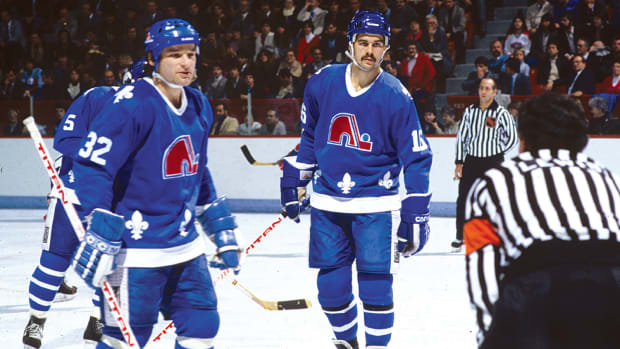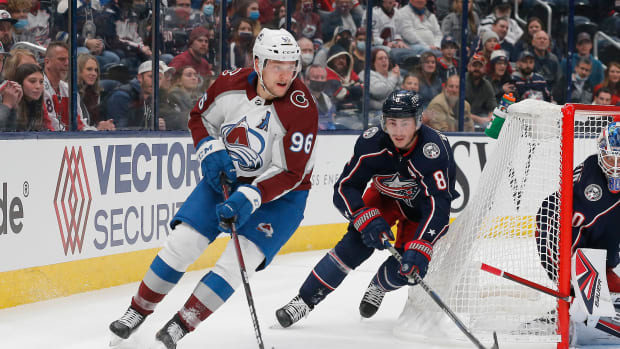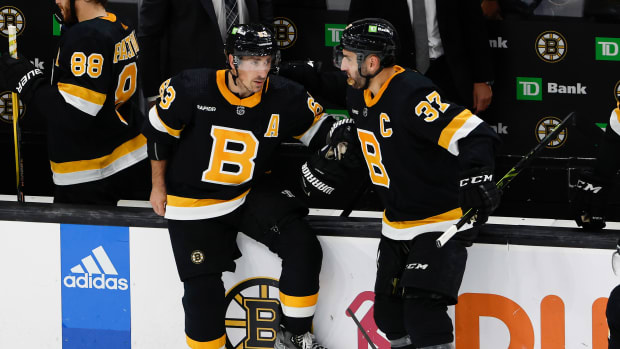In Part 2 of this two-part Q&A, Trottier remembers his departed linemates Mike Bossy and Clark Gillies, the Islanders’ incredible run of four straight Stanley Cups, plus his role in Indigenous rights and mental health awareness.
But first, check out Part 1 to learn more about Trottier from his childhood to the NHL.
Sam McCaig: Let’s talk about the dynasty. I’m sure you’ve been asked every question from every angle, but it’s 40 years later and no one has really come close to winning four Stanley Cups in a row like the ’80s Islanders. Do you think we’ll ever see four straight Cups again?
Bryan Trottier: It’ll be tough. It’s going to be tough for any team. Look at Tampa Bay, such a strong team. Look at Chicago a few years ago, like, oh my god, these guys are going to knock on the door for a few years. But there’s free agency, players move around a little more, and it’s hard with the salary cap for teams to keep everybody. And, you know, a bad bounce or maybe a referee call, who knows, you just have to overcome some of that stuff. And there are lots of things that can bite you…a hot goalie, a cold goalie. (We won in) overtime, we’re so proud of that. But we almost didn’t win, what was it, our third one against Pittsburgh (in the first round in 1982). I said to myself, ‘Holy cow, it could’ve ended pretty quick.’ But you know, it just kind of took on a life of its own. We were young and we all stayed healthy, and the core group stayed together. And (GM) Bill (Torrey) and (coach) Al (Arbour) were Bill and Al, they found a way to kind of keep us motivated.
SM: Not long after you arrived in the NHL, the Canadiens won four in a row. Then you guys won four in a row, then the Oilers won five in seven years. Then after that, Pittsburgh won two in a row and obviously, you were there for those, too. I don’t know if we’ll ever see that kind of stretch in the NHL again, what a golden age for the league.
BT: It really was. You look at Montreal, four Cups. We had four Cups. Edmonton, five in seven years. That’s, like, 15 years, with three teams dominating. That was impressive. And, you know, there were lots of other great players and teams around then, a lot of teams that could have gone to the finals and won. But it was our time, and it was Edmonton’s time, and Montreal’s. But the really cool thing is we studied Montreal, how they practised, how they conducted themselves, how they behaved. And when we lost to the Oilers, they told us they did the same thing. They watched how we practised, they watched how we behaved, how we were champions. I said, “Those creeps, they did the same thing to us that we did to Montreal.” But that’s what all good teams do. We’re all good thieves who watch the very best and we want to take away from the very best and be like them. And so it was really kind of a compliment, because we sure complimented Montreal by watching them, and they were great champions. Guy Lafleur, Larry Robinson, Ken Dryden that whole team, they had a ton of Hall of Famers, and how they practised, it was spectacular, so fast and quick and snappy. We wanted to be like them on and off the ice.
SM: You were on the bench when the overtime goal was scored in the 1980 Cup final, and your skate got stuck when you jumped over the boards and you kind of face-planted on the ice. Is that your memory of the first Cup?
BT: Yeah, I was jumping over the boards and the top of my skate, my toes, got hooked in the boards and I ended up doing a header. I picked myself up and Kenny Morrow was standing right there, and he grabbed me and we were hugging. I just remember feeling so exhausted, and a vivid flash of mom and dad went through my head, my dad saying to me, “Rest fast, get ready for the next shift!” and all those things are going through my mind, my buddies back home, and I remember saying to Kenny, “I’m so tired,” and the smell of his equipment kind of hit me because your senses peak. Like, you’re trying to grasp the moment, what happened, you know. Your eyesight, your hearing, smell, touch, everything. The Stanley Cup, it was so cool just to touch the names and everything. That moment is forever etched in my mind. People always ask me, “What’s your greatest moment in the game?” The moment Bobby Nystrom scored the overtime goal that made me a champion for the first time will always stand out. I tell Bobby all the time, “Thank you, thank you, thank you.” He says, “You’ve thanked me enough already!” And I go, “No, I’m still going to thank you.”
SM: You had a great line in the book about when they gave you the Cup and right away you saw Jean Beliveau’s name on it. He was a guy you had looked up to when you were young, it was kind of the hockey circle life coming around.
BT: Oh, I wanted to read all the names on there. Yeah, we went right over to the Cup, Denis (Potvin) and I, and I grabbed it because I wanted to feel it, I wanted to hold it, hug it, and I want to find the names of my favorite players growing up, like Beliveau, Gordie Howe, look around and find Stan Mikita, saying to myself, “Oh my god, they’re gonna put my name on here, it’s gonna be on here forever.” That moment is beyond proud because, like, my name, the Trottier name, is going to be on the Cup, I couldn’t wait to call home. And celebrating with Denis, “We did it, we did it, we did it.” And the teams we beat that year, we beat the Triple Crown Line in L.A., we beat the French Connection in Buffalo and they were both great teams, they had great seasons. We beat the big, bad Bruins. They wanted to intimidate us, but our team didn’t back down. And then we had to beat Philadelphia in the final after that amazing stretch they had (the Flyers set an NHL record with a 35-game unbeaten streak during the 1979-80 season), and the players they had, Bobby Clarke and Reggie Leach and everybody else, and the reputation they had, the Broad Street Bullies. But we found ways to beat all those teams. It was a tremendously satisfying Stanley Cup.
SM: I’m sure you have a million memories of Mike Bossy. What are some of the special memories that stick with you?
BT: I’ve said and written so many things about Mike, it’s hard to know which ones I’ve repeated so many times. But Mike was completely underrated and the best purest goal-scorer ever. But for me, he was beyond that, he was a friend, we pushed and pulled each other and we cared about each other, we loved each other. And, you know, I felt that all the time, I’d go to the rink and look forward to seeing him. So when he couldn’t come to the rink anymore because of his back, I was devastated. I said, “You’ve got to get your butt down here, we’ll find a way to get you back.” He was like, “I can’t, I seriously can’t.” And he went back to Montreal and I was like, “What are you doing?” He said, “I don’t think I can play anymore,” and I’m like, “You’re too young.” So that whole thing to me was tragic. He’s my friend. He’s basically a brother. And I’m like, there’s nothing I could do. And it was the same when he got sick, I felt exactly the same thing. This guy, he’s too young. This can’t be happening. There’s nothing I could do. This is not the way I wanted this to be written in history, but it’s not up to me.
SM: What would you want people to know about Bossy that maybe they don’t know?
BT: Off the ice, he was a private man. But he was so unselfish. He was just such a loving person. And he loves deep. I know his wife, I know his daughters, I know his granddaughters. And each one of them is a reflection of this man because of how he loved. And, you know, on the ice, people would say, “Oh, he’s selfish, he only wants to score goals.” Well, you know what, that’s a good selfish because he wanted us to win. And I used to praise him about that. Because knowing Mike, how he is, how much he cares, how much devotion he has, especially for his family and friends. I mean, I felt if I called Mike up tomorrow, he’d be the first one there. And that’s how you can rely on a great friend, you have that kind of trust and love for somebody. He was the best of the best.
SM: Like you and Bossy, Clark Gillies is a Hall of Famer, but he kind of gets third billing when people talk about your line. Can you tell us what Gillies meant to your line’s success and the team’s success?
BT: Yeah, he was not a third wheel when it comes to us because we made him the biggest part of this, because without him, without his presence, without his power, without his skill…like, he was underrated in so many ways. Heavy shot, accurate shot. Drive to the net. He just created so much space for us, and we appreciated him so much. He was our big brother on the ice. As a line, we don’t have that kind of success without Clarkie. We don’t even try to kid ourselves about that. We would’ve had some success, we played with other guys sometimes, but it was Clarkie that made our line and made us not have to worry about getting beat up, or lose our heads or have someone take liberties with us. You needed that presence, and we loved Clarkie because he could skate, he could score, he was powerful and he was always right there, you know, just like a big brother.
SM: I want to talk a bit about your post-playing career and what you’re up to these days. One issue that comes to mind is Indigenous rights, there seems to be more awareness in Canada now, and I’m interested to hear your perspective given your experience. You’ve been out there for a long time, talking to communities and reaching out to people. Can you give us some specifics about what you’re doing and how you see your role?
BT: We’ve been doing this for so long. I don’t talk about the politics of it all. But what I really talk about is the opportunity for the talents of our First Nations kids to shine, and they’re so talented, such a talented group. And they’re shy and they don’t want to leave home, they’re a lot like me, you know, I can relate, I understand, and being a little bit of an ambassador for the game of hockey, we can go in there with a good message and talk to the kids and maybe inspire them a little bit, get them to chase their dreams. It doesn’t have to be in hockey. It can be music or art, whatever their dream is, and that’s what we really talk about. We don’t go in there and talk about the history of where they are, or reparations or anything like that. We really talk about opportunity and how they can best achieve their dream, like I did, like John Chabot did, like Ted Nolan did, like a lot of us with Indigenous blood did. We’re proud of that. We’re proud of our heritage and we want them to be proud, too. So to get some awareness, to get some attention, great, and to improve the lives of Indigenous families and get some other opportunities with what awareness at the same time, great. But our message is one of opportunity and making good choices and doing what you can do to seek help and support and achieve your dream. The kids are very responsive, the parents are appreciative and the teachers love us. And we love them and it’s kind of win-win-win.
SM: Speaking of increased awareness, another issue that comes to mind is mental health. Talking about mental health today is a lot different than talking about it 10 or 20 or 30 years ago. It’s an important conversation to have and I just wanted to hear your perspective on that as well.
BT: I think the fact that everybody’s so aware of mental health and mental wellness is fantastic. You know, I’ve had my bout, maybe bouts, who knows, but when you recognize what it is, and you find the right kind of help and support…it’s really difficult for people to reach out and say, “Hey, I need help, I need help, help me, help me, help me.” If someone asked me, I’d be the first one there. But it’s how we see ourselves, right, the perspective that people have and the stigma that it has, and now that stigma is lifting and people aren’t afraid to say, “Hey, I need a little help.” It’s students, it’s young people, it’s the elderly, whoever, it doesn’t miss anybody. That’s a lot of different people. So I think it’s wonderful that there’s support and there’s help, good help, and tools that can help people who are having a tough time.
SM: That’s great, thanks, Bryan. I just have one more for you. You’re living in Pittsburgh these days, so I just have to ask you, when the Islanders come to town and you’re at the game, who are you cheering for?
BT: That’s an easy one. I’ve been doing this for a long time, cheering for my Islanders and cheering for my Penguins. I always cheer for the home team because I want the fans to go home happy and I want the home team to win all the time.
SM: Thank you so much for taking the time. It was a real pleasure to talk with you and best of luck with the book.
BT: Thank you very much.



